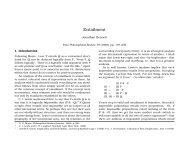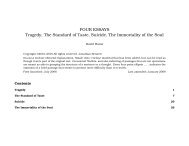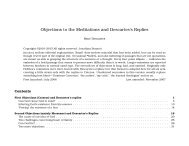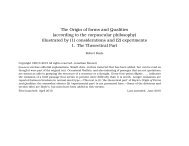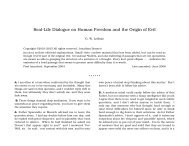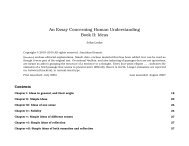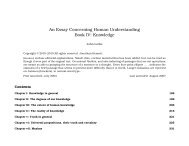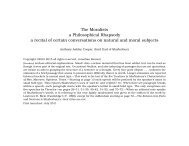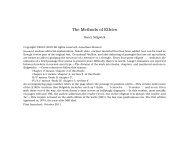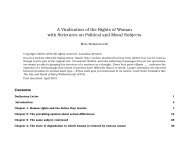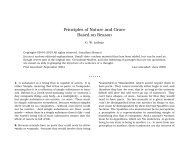The Form and Principles of the Sensible and Intelligible World
The Form and Principles of the Sensible and Intelligible World
The Form and Principles of the Sensible and Intelligible World
Create successful ePaper yourself
Turn your PDF publications into a flip-book with our unique Google optimized e-Paper software.
<strong>The</strong> <strong>Sensible</strong> <strong>and</strong> <strong>Intelligible</strong> <strong>World</strong> Immanuel Kant I: <strong>The</strong> notion <strong>of</strong> a world in general<br />
[Three warnings concerning Kant’s title for this work:<br />
world: <strong>The</strong> plural ‘worlds’ would fit better.<br />
form: Kant makes it clear that we are dealing with at least two forms, one for each world<br />
principles. . . <strong>of</strong> <strong>the</strong>. . . world: In this work ‘principles’ are usually sources, causes, origins [see Glossary], <strong>and</strong> in that sense<br />
principles come in (especially in Sections III <strong>and</strong> IV, including <strong>the</strong>ir titles) as <strong>the</strong> sources not <strong>of</strong> worlds but <strong>of</strong> <strong>the</strong> forms. Still,<br />
sentences in bold type on pages 3 <strong>and</strong> 16 suggest that Kant thought that something could be <strong>the</strong> source <strong>of</strong> a world by being <strong>the</strong><br />
source <strong>of</strong> its form.]<br />
1. Start with something x that is substantial <strong>and</strong> composite,<br />
<strong>and</strong> analyse it into its simpler elements; this process doesn’t<br />
come to an end until we reach a part that is not a whole<br />
·made up <strong>of</strong> simpler parts·, i.e. until we reach something<br />
simple. <strong>The</strong> opposite process <strong>of</strong> syn<strong>the</strong>sising—·combining<br />
x with o<strong>the</strong>r substances·—doesn’t come to an end until<br />
we reach something that isn’t a part ·<strong>of</strong> anything bigger·,<br />
i.e. until we reach a world.<br />
In this exposition <strong>of</strong> <strong>the</strong> concept <strong>of</strong> a world, I shall not<br />
only attend to <strong>the</strong> marks appropriate to a distinct knowledge<br />
<strong>of</strong> <strong>the</strong> object but shall also give some attention to its two-fold<br />
origin in <strong>the</strong> nature <strong>of</strong> <strong>the</strong> mind. So <strong>the</strong> exposition may set<br />
an example that leads to a deeper insight into metaphysical<br />
method, which I see as well worth doing. For it is one<br />
thing to (a) employ an abstract notion <strong>of</strong> <strong>the</strong> intellect to get<br />
from a thought <strong>of</strong> <strong>the</strong> parts to a conception <strong>of</strong> <strong>the</strong> whole<br />
that is composed <strong>of</strong> <strong>the</strong>m, <strong>and</strong> it is a quite different thing<br />
to (b) take this general notion ·<strong>of</strong> <strong>the</strong> composite whole· as<br />
a problem set by reason, <strong>and</strong> to try to chase it down by<br />
employing <strong>the</strong> sensitive faculty <strong>of</strong> knowing, i.e. representing<br />
it in <strong>the</strong> concrete by a distinct intuition. In (a) composition<br />
is secured through <strong>the</strong> class concept, if it’s <strong>the</strong> concept<br />
Section I: <strong>The</strong> notion <strong>of</strong> a world in general<br />
1<br />
<strong>of</strong> a plurality <strong>of</strong> mutually related things; so this is work for<br />
universal ideas <strong>of</strong> <strong>the</strong> intellect. In (b) <strong>the</strong> endeavour is to<br />
attain <strong>the</strong> concept <strong>of</strong> <strong>the</strong> composite in time, generating it by<br />
successively adding part to part; <strong>and</strong> that is syn<strong>the</strong>sis, a<br />
process that is subject to <strong>the</strong> laws <strong>of</strong> intuition. Similarly,<br />
given a substantial composite, we easily reach <strong>the</strong> idea <strong>of</strong><br />
its simple [see Glossary] parts by stripping from <strong>the</strong> thought<br />
<strong>of</strong> it <strong>the</strong> intellectual notion <strong>of</strong> composition, because when<br />
composition is removed whatever is left is simple. But when<br />
<strong>the</strong> laws <strong>of</strong> intuitive knowledge are in play, it’s a different<br />
story: <strong>the</strong> only way to remove composition now is by a regress<br />
from <strong>the</strong> given whole to all its parts, this being an analysis<br />
that occurs in time. [Kant has here a difficult footnote about two<br />
kinds <strong>of</strong> analysis <strong>and</strong> a corresponding two kinds <strong>of</strong> syn<strong>the</strong>sis. We don’t<br />
need this for what follows.]. . . . Thus, for analysis to be carried<br />
through to <strong>the</strong> point <strong>of</strong> yielding <strong>the</strong> concept <strong>of</strong> <strong>the</strong> simple, it<br />
must be brought to a conclusion in a finite <strong>and</strong> assignable<br />
time; <strong>and</strong> <strong>the</strong> same is true <strong>of</strong> a syn<strong>the</strong>sis that is to be yield<br />
<strong>the</strong> concept <strong>of</strong> <strong>the</strong> whole.<br />
In a continuous quantum, however, one can’t get to <strong>the</strong><br />
end <strong>of</strong> <strong>the</strong> regress from whole to parts; <strong>and</strong> in an infinite<br />
quantum one can’t get to <strong>the</strong> end <strong>of</strong> <strong>the</strong> progress from parts



